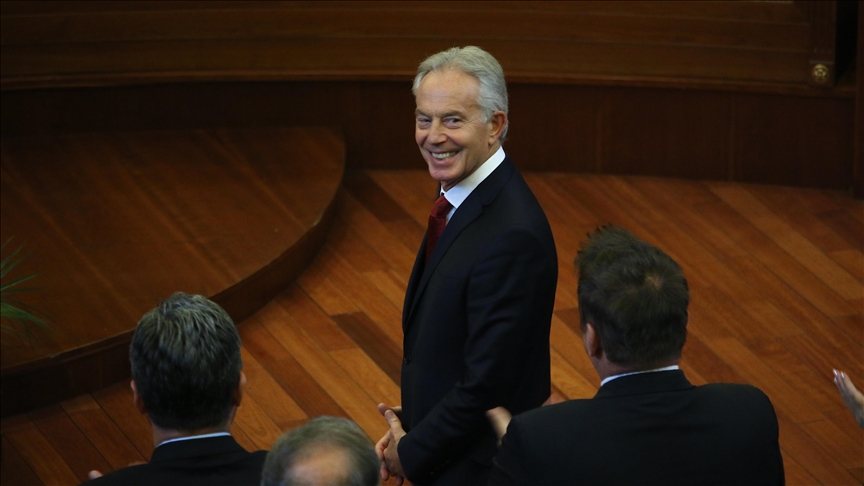Starmer’s government, Blair’s shadow: Who speaks for Britain in Gaza?
2 decades after Iraq invasion, former British Prime Minister Tony Blair is once again positioned at the heart of high-stakes Middle Eastern gamble

LONDON
When Keir Starmer moved into 10 Downing Street in July 2024, many observers wondered whether Britain’s new Labour government might still be working in the shadow of former Premier Tony Blair.
The new prime minister had drawn on Blair’s old advisers, and the comparison seemed inevitable.
But after US President Donald Trump unveiled his 20-point plan for Gaza, the sense that Blair was back at the center of Middle East diplomacy became harder to dismiss.
The former Labour leader – condemned by many as a war criminal for his role in Iraq – appeared to step once again onto the stage, less as a relic of the past than as a de facto fixer for Britain’s interests.
He released a statement after the announcement late Monday, calling the proposal “a bold and intelligent plan.”
While Starmer’s government offers the symbolic recognition of Palestine, Blair is seemingly angling for influence in Gaza. The contrast is as jarring as it is telling.
The plan, which calls for the release of Israeli hostages in exchange for Palestinian prisoners, the disarmament of Hamas, and the formation of a temporary governing committee for Gaza, is said to envisage Blair heading a transitional authority.
Under the proposal, this would be backed by the UN and Gulf states before eventual handover to Palestinians. Blair’s office has reportedly insisted he would not support any arrangement that displaced the population of the Gaza Strip.
Blair is believed to have met both Mahmoud Abbas, the Palestinian Authority president, and Trump earlier this summer, though how fully the Palestinians were briefed on the proposal remains uncertain.
'The wrong messenger for Gaza'
Blair’s role in the 2003 invasion of Iraq – based on flawed intelligence and the false premise of weapons of mass destruction – remains an indelible stain on his record.
The Chilcot Inquiry, published in 2016, concluded that Britain went to war before all peaceful options had been exhausted and that Blair overstated the threat posed by Iraqi President Saddam Hussein.
It also revealed Blair’s private assurance to President George W. Bush in July 2002 that he would stand with him “whatever.”
For large parts of the Arab world, and not a few in Britain, Blair is not an elder statesman but a war criminal.
That baggage looms large over his re-entry into Middle Eastern diplomacy.
Iain Overton, the executive director of Action on Armed Violence, a London-based NGO, is blunt: “After Iraq, Tony Blair is the wrong messenger for Gaza. A credible transition must be Palestinian-led, UN-anchored, and laser-focused on civilian protection. Anything else looks like management of an occupation by other means.”
He told Anadolu that legitimacy, not technical skill, is the defining challenge: “Whatever his experience, the legitimacy deficit is painful and stark. For many Palestinians, and many beyond, Iraq stands for strategic folly and grave civilian harm. That baggage will follow him and would color any decisions he takes.”
'Cherry on the cake is Tony Blair’s involvement'
Yara Hawari, co-director of the Palestinian think tank Al-Shabaka, is sharper still.
“Palestinians have always been denied the freedom to define the contours of their future. It is a critical pillar of the colonial project that seeks to dominate them indefinitely. Trump’s latest plan is simply another manifestation of this.
“The cherry on the cake is Tony Blair’s involvement – a war criminal and mercenary who is responsible for the deaths of hundreds of thousands in the Middle East and has a particularly murky history in Palestine. It’s audacious as it is cruel.”
What is needed, she argues, is not another layer of imposed governance but an end to what she calls “genocide” and the establishment of accountability mechanisms that deliver justice to Palestinians.
Mustafa Barghouti, general secretary of the Palestinian National Initiative, echoed this sentiment in simpler terms in a Monday piece for The Washington Post: “We’ve been under British colonialism already. He has a negative reputation here. If you mention Tony Blair, the first thing people mention is the Iraq war.”
'Gaza does not need a board of foreign grandees'
The unease is not confined to Palestinians. Blair’s prior stint as Middle East envoy, under the auspices of the Quartet, yielded little durable progress, while his close relationships with Israeli leaders continue to fuel suspicions of bias.
As Overton put it: “Gaza does not need a board of foreign grandees; it needs accountable institutions, basic security, and aid delivered at scale.”
Yet Trump, praising Blair as a “good man,” insists the former prime minister would be part of a “Board of Peace” alongside other distinguished figures.
Israel has welcomed the idea, predictably saying that neither Hamas nor the Palestinian Authority can be allowed to govern Gaza in the interim.
Hamas, for its part, has said it will study the proposal but has long refused to disarm or surrender political authority.
Thus, two decades after Iraq, Blair is once again positioned at the heart of a high-stakes Middle Eastern gamble.
His defenders argue that his experience and contacts make him uniquely suited to navigate the thickets of diplomacy.
His detractors counter that legitimacy cannot be subcontracted to a man so synonymous with strategic miscalculation and civilian suffering.
Anadolu Agency website contains only a portion of the news stories offered to subscribers in the AA News Broadcasting System (HAS), and in summarized form. Please contact us for subscription options.


